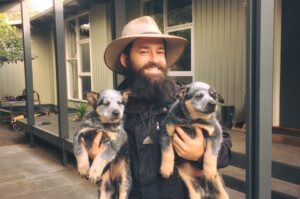We typically think about breeds in terms of what they look like, how they behave and what grooming they require.
But certain breeds have innate skillsets that can be developed for use in an array of human contexts, from sniffer dogs in police and customs to guide dogs for the vision-impaired, therapy dogs for those living with disability to cattle dogs working on a farm.
That’s where specialty dog breed training that goes beyond your basic sit and stay commands can help them shine.
Specialty dog breed: German Shepherds
Jimmy Graham from Jimmy’s Dog Training branched into specialty breed training classes after becoming the owner of a German Shepherd.
“That’s been a rollercoaster of learning. I’ve got a rottweiler who’s been my righthand man for about twelve years. But he’s got arthritis and a bung knee now. So, I needed a young apprentice.”
Gus, the 12-year-old rottie, stepped down, paving the way for Jerry Lee, the frisky shepherd, to take up the role.
Jimmy began to wonder whether there was interest in his regional Victorian community, in breed specific training; specifically German Shepherds.
And there was. In May, about 18 shepherds and their owners attended training, focusing on a range of things from basics to scent detection.
Specialty dog breed: Kelpies and Collies
Further along the Surf-Coast Highway in Torquay, Kitti Brown from Country Girl Co. runs specialty breed training for kelpies and border collies.
She says there are three kinds of classes. Straight-forward training firstly for working farm dogs and secondly for traditional working dogs that are suburban pets. Then, there’s the more complex training for dogs on hobby farms that need to bridge the skills of a working dog with the placidity of a pet dog.
Kitti says she usually has a one-on-one with dog and owner, assessing needs and temperament, before referring them to sessions with between four to six dogs and owners.
Her approach is not food-driven, rather the training is its own reward for these smart dogs.
“A lot of dogs are quite frustrated because we’re repressing their natural instinct of herding,” she explains.
“We get them in their natural environment out here (on the farm) and then give them an outlet for that. The dog learns to respect its owner in terms of ‘this person has something of value to say and I’m going to have fun doing it’. You start to fulfil that need.”
Other specialist areas
The National Dog Trainers Federation can also refer owners to specialty breed training aligned with areas such as substance detection, law enforcement or security work for dogs.
Scent detection, widely used in wildlife conservation, is also taught by a variety of dog trainers around Australia, including ProDog in Melbourne’s west.
If you do want to develop a particular skillset with your dog, first consider why you want it – is this to get them working in some capacity or simply to challenge them at home?
That will help you identify the right type of specialty dog training for you and your pup.










